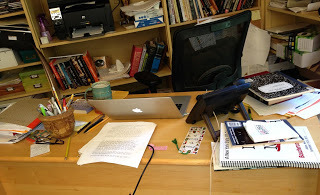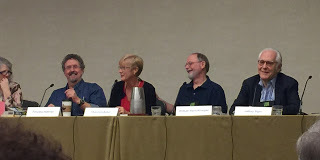Terry Shames's Blog: 7 Criminal Minds, page 224
May 25, 2016
Final Edits
My sister is writing a novel, a debut effort. She hopes to be done with the first draft sometime this summer. She told me she loves watching her story unfold on the page and loves having the characters do surprising things. She belongs to a writer’s group that sounds like a perfect blend of writers who are serious and who take each other’s work seriously. I have fantasies of the two of us being published authors. But she and I both know she’s got a long haul before her book is ready to send out.

(My multi-talented sister is an artist--this is one of her paintings, set in the area I used as a model for Jarrett Creek)
In anticipation of being done with her first draft, she asked me if during the editing process I find that I have to take out and add whole chapters. I told her that although I may not have to take out whole chapters, I often have to take out or rearrange big chunks. In fact, I’ve never known an author who didn’t. By the time you finish a first draft, you have redundancies, story lines that petered out, loose ends, characters who need to be reined in or pumped up, and a whole lot of terrible grammar.
I often have problems with the end, having to add scenes or even chapters. I think, like a horse going home to the barn, I start galloping toward the end and begin to summarize. Later, when I read what I’ve written, I realize that what was in my head hasn’t necessarily made it onto the page.
I’m now almost done with the third edit, and I think I’m coming down to the wire. The major glitches have been addressed, the arc of the story and the chapters completed, the loose ends tidied, the character arcs resolved, the story lines finalized. Or have they? I always find that when I go back over a manuscript “one more time”, I still have tidying to do. There will be a character I left hanging, or a story line that didn’t quite resolve. One more pass turns into two, three, five more passes. And then I’m done.
But wait! There’s one more pass. I call it the “golden words” pass. I have to find out many times I have used the golden words that I love: “About, just, almost, somehow, seems….” That one last pass is vital. Golden words are often placeholders for the thing you are really trying to say, or are used as lazy adjectives. “She was just fine” not only reads as well if you say, “She was fine,” but is actually stronger. Placeholder words slow down the action and make prose sound hesitant.
I promised my agent I’d have the manuscript to her this week so I can get it to my editor by June 1. So now…one more edit.
Published on May 25, 2016 07:53
May 18, 2016
Writer's group critiques
I was thrilled to hear that my writer’s group loved Samuel #6. But of course what that means is that they loved it in general. In specific they had many comments and suggestions. The good part was that the comments and suggestions were along the line that I had already figured needed to be done.
When you get critiques you have a few possibilities:
1) Everyone will love it and have nothing but glowing comments. Dream on! Has this ever happened in the history of writer’s groups? I can just hear Laura Lippman’s critique: Jeez, Baltimore, Baltimore, Baltimore. Can’t you ever write about anything else? Or how about Michael Connelly: Bosch is such a downer. I mean couldn’t the guy ever have a cheerful moment? How about Rhys Bowen: Georgie, get a job, for heaven’s sake! Always with the impoverished royalty bit.
I don’t care how brilliant a writer is, there are always going to be people who want their writing to be different. You have to be on the lookout for people who don’t like your voice, your topic, your setting, and so on and not be swayed from your intentions.. A really good member of a critique group will read a piece at face value, trying to put aside personal prejudices and to help the writer improve based on what she is trying to achieve.
2) Everyone will hate it and send you out the door and tell you never to return. Admit it: that’s what most writers are afraid of. But just like #1, that’s very unlikely. No one in the group may wholeheartedly like everything about what you’ve written, but most people will find something that appeals. One person may love the setting, another loves the plot, another the voice. And sometimes you will get a reader who truly loves what you’ve done. Yes, treasure that person, but remember, he isn’t the reader you will learn from. You learn from the reader who gets what you are trying to achieve and who gives you advice that will both support you and help you move toward your goal.
3) People will be divided down the middle. It used to drive me crazy when half my writer’s group would love what I had written and half would tear it to pieces. I didn’t want to ignore the critics, but I also didn’t want to throw out what I had written. I knew deep down that there was some good and some bad in my work, but how was I to know the difference?
The answer lies in listening carefully. Don’t just hear what you are afraid a critic is saying. And don’t just hear what you hoped a reader would appreciate. Listen to the actual words. Write down what people say. If necessary, ask them to clarify. And then let the work sit for a day or two.
And then trust your instinct. You may not want to admit that you knew all along that something needed another look, but you know deep down. You have that, “darn it, I thought that would slip by” moment. If you let it slip, you are doing yourself and the person who worked hard to help you a disservice. That’s why you are in a writer’s group, after all.
Published on May 18, 2016 06:03
May 11, 2016
To Group or Not?

Should I jump in?
Not everyone wants to get advice from a writer’s group, and not every writer’s group works well for every writer. But if you do decide to pass your work by some other writers, there are things you need to consider.
Writer’s groups come in all shapes and sizes. They have various numbers of members, meet at different intervals, and critique any number of pages. In some groups everyone submits a certain number of pages for each meeting. In others one person submits a substantial chunk. I personally prefer to submit a whole novel, or at least a big chunk because I want to know how a novel is working overall for readers. But I know others who prefer to work in 20-page increments, revising one scene or chapter until they feel good about it before they move on. It’s important when you decide you want to join a writer’s group that you choose one that has a structure that supports the way you work.
It’s especially critical that you join a group whose members respect each other. I’ve heard horror stories about group members who try to rewrite people’s books, who give nasty critiques, who argue when people try to provide honest critiques, and who don’t manage to read others’ work while expecting other members to spend time on theirs. You have to be able to trust that the members of the group have your interest in mind as well as their own, and that they can give and take honest criticism. It’s just as crucial to get real, honest feedback as it is not to get overly critical feedback. A reader should give both positive and constructive comments. It does the writer no good to only hear only bad news—it crushes the spirit and makes it hard to approach the manuscript editing with enthusiasm. But it also does no good to only hear how wonderful a piece of writing is. You don’t join a group just to get strokes.
I happen to belong to a group of four writers, and I’m the only crime writer in the group. The reason it works for me is that the others have respect for the kind of work I do, and even if they aren’t mystery readers, they understand the genre and critique my work according to my intention, not just for their reading preferences. I learn a lot not only from their critiques, but also from what they write and from the critiques they get.
At one time I belonged to a group of all crime writers and I really enjoyed reading their work and getting their feedback. Unfortunately the group stopped being the best fit for me. When we formed the group, the process was that we each submit an entire manuscript, which meant with six writers, one writer’s turn only came around every six months. It worked fine when we were all unpublished and did have not have deadlines, but once people started writing under contract, it was impossible to wait several months for feedback. That group still gets together on occasion to catch up with each other. It didn’t disband because of bad feelings, but because it stopped meeting everyone’s needs.
Because I have a June 1 deadline, I had my critique last week. It was very satisfying because what I heard was that the book works well overall and that it needed some editing. There were no surprises in terms of what needed to be done, and I’m already ripping through it beefing up the parts that weren’t up to par.
Next week I’ll talk about that “beefing up” process.
Published on May 11, 2016 06:43
April 27, 2016
"Real" Editing
Now for the Real Editing

The first read-through of a first draft can be a jolt. I don’t know about other writers, but I sometimes come across intriguing threads that I never developed. I may have a vague recollection of what triggered the idea, but just as often my reaction is, “What was I thinking?” It’s fine if I realize the thread doesn’t fit what the book became. I simply extract the thread with great care (think of the game of Pick-up Sticks), and make sure I haven’t left loose ends.
But sometimes I think the idea should have been developed. In that case, I stop and think about the ramifications on the completed book:
1) Will incorporating the thread resonate throughout the book? Does it require a complete rewrite? If so, do I have time to make it work?
2) Does it change the intention? Is that a change that I’m happy with? Will I be disappointed with the book if I don’t do it?
3) Will the new thread strengthen the book? If I can’t answer that question, is it something that might be more suited to another book in the series? Is there a less disruptive change I can make that will get the same point across?
If the answer is that I think the book will be better for incorporating the stray idea, I make notes on how to weave it in, and continue reading. I’ve had the spooky experience of thinking I didn’t work a thread into the story, only to find that I did, and that all it requires is some judicious adding or subtracting of sentences to make it stronger.
In this edit, unless I think the book is a complete failure, I don’t make more than cosmetic changes. For example, if I find a paragraph that is weakly developed, I might rewrite it. But mostly I make notes to remind myself where I need to take a hard look at some section I’ve written. The notes can be anything:
11) Miss X doesn’t pop off the page. Why? 2) Do I really need the scene with the pig?33) Have I sufficiently researched how this kind of autopsy would proceed? 4) Does this character come across the same way she did in Previous books?I 5) Is the action in this section realistic? Is the language going to offend anyone unnecessarily?
I also take note of scenes that I got caught up in. Sometimes that means the scene really works. But sometimes it means that I think I’ve made the scene work, but actually my vision of it is what drives my reading of it. I note that I need to go back and read those scenes dispassionately, making sure my words match what is in my head.
And after this read, I hope I have a few more days to let the manuscript rest, to give my subconscious time to tell me what I still need to do. Next week: the writer’s group.
Book recommendation: The Steel Kiss, Jeffrey Deaver. I like Deaver’s writing. He writes a good, solid thriller, without reverting to the kind of outrageous, over-the-top action that puts me off in some thrillers.

The first read-through of a first draft can be a jolt. I don’t know about other writers, but I sometimes come across intriguing threads that I never developed. I may have a vague recollection of what triggered the idea, but just as often my reaction is, “What was I thinking?” It’s fine if I realize the thread doesn’t fit what the book became. I simply extract the thread with great care (think of the game of Pick-up Sticks), and make sure I haven’t left loose ends.
But sometimes I think the idea should have been developed. In that case, I stop and think about the ramifications on the completed book:
1) Will incorporating the thread resonate throughout the book? Does it require a complete rewrite? If so, do I have time to make it work?
2) Does it change the intention? Is that a change that I’m happy with? Will I be disappointed with the book if I don’t do it?
3) Will the new thread strengthen the book? If I can’t answer that question, is it something that might be more suited to another book in the series? Is there a less disruptive change I can make that will get the same point across?
If the answer is that I think the book will be better for incorporating the stray idea, I make notes on how to weave it in, and continue reading. I’ve had the spooky experience of thinking I didn’t work a thread into the story, only to find that I did, and that all it requires is some judicious adding or subtracting of sentences to make it stronger.
In this edit, unless I think the book is a complete failure, I don’t make more than cosmetic changes. For example, if I find a paragraph that is weakly developed, I might rewrite it. But mostly I make notes to remind myself where I need to take a hard look at some section I’ve written. The notes can be anything:
11) Miss X doesn’t pop off the page. Why? 2) Do I really need the scene with the pig?33) Have I sufficiently researched how this kind of autopsy would proceed? 4) Does this character come across the same way she did in Previous books?I 5) Is the action in this section realistic? Is the language going to offend anyone unnecessarily?
I also take note of scenes that I got caught up in. Sometimes that means the scene really works. But sometimes it means that I think I’ve made the scene work, but actually my vision of it is what drives my reading of it. I note that I need to go back and read those scenes dispassionately, making sure my words match what is in my head.
And after this read, I hope I have a few more days to let the manuscript rest, to give my subconscious time to tell me what I still need to do. Next week: the writer’s group.
Book recommendation: The Steel Kiss, Jeffrey Deaver. I like Deaver’s writing. He writes a good, solid thriller, without reverting to the kind of outrageous, over-the-top action that puts me off in some thrillers.
Published on April 27, 2016 09:54
April 20, 2016
Editing Interrupted by Life
First draft written, I know that the next draft needs work and am ready to look at it critically. I've taken time off to let the manuscript settle in, and now it’s time to start editing. Uh, oh. Not so fast. Clouds on the horizon in the form of jury duty--a case that will last three of the precious six weeks I have set aside for editing. Three weeks of 9-5. Three weeks of unexpected duty.
It doesn’t have to be jury duty; it could be anything that suddenly makes your editing life a lot harder. A parent gets sick and you have to fly across country to take care of him. Your house floods. You get a horrible cold. It can be anything. Bottom line: Life intervenes.

When I set out to edit a first draft, I like to read the manuscript all the way through to get the overall picture of what needs to be done. I jot down ideas as I read, but basically I want to experience the story the same way a reader would. But reading beginning to end means I need a big chunk of time to get the continuity (or lack of).
Being on a jury, there’s no way I can get a chunk of time to do that read unless I’m willing to get up at 3AM and read until 9AM or start reading at 5PM and stay up until I’m done. Or I could wait until the weekend, which means giving up days I had counted on for editing.
So it looks like I’ll have to approach it differently, or tell my editor that I need extra time. I’ve never failed to meet a deadline, and I don’t like the idea of doing so now. I suspect what I’ll do is forego the full-time read through and instead read in chunks. Not my ideal, but then nobody gets their way all the time.
The important thing in this post is to realize that not everything goes according to plan when you are writing. On the writing side, you can get bogged down in research, or your editor has concerns about some part of the book, or you aren’t satisfied with it and can’t figure out why. And then there is the “life” part. Lots of things can go wrong and throw you off, but the professional writer has to figure out a way to muddle through. Of course I’m not talking about a major setback—death, health issues, or disaster. I’m talking about those little bits of life that make you veer off your perfect plan.
I’m writing this in the jury room. Those of us on the jury have been here all afternoon waiting to be called to the courtroom. It’s interesting to see how many people don’t do much of anything when the time stretches out. I’ve been reading Jeffrey Deaver’s The Steel Kiss, and finally decided that at least I could write a quick blog.
And now for the good news. At 4:20 we were called in and told our services were no longer needed. Oddly, several of us expressed some disappointment. We had already bonded. I liked the people chosen for the jury! But now the little glitch in my editing has been cleared and tomorrow morning I’ll begin reading the whole shebang!
Published on April 20, 2016 10:24
April 13, 2016
Pre-editing
Last week I talked about recognizing the need to edit your work. This week I will talk about how to begin.
You’ve finished your first draft (at least you typed “The End”). Now comes the important second step: letting the work sit for a while. I call this percolating, or maybe stewing, or maybe even agonizing. But it’s an important step, even if you only have a day or two to step away. There are a couple of reasons to let the manuscript sit. First, you are too close to the work. You have lived with the characters and the story for so long that it’s hard to separate what you know internally from what you’ve actually gotten onto the page. Sure, you’ve thought of several things you forgot to include, or you’ve thought of a nice little twist you can add. Take notes about these. But give yourself a chance to forget what you think you know, so you can go back to the work with a fresh eye. You need to be able to approximate the experience a reader will have when she reads the book for the first time.
Second, you need to give yourself a chance to celebrate and rejuvenate. Celebrate the fact that you have managed what millions or people dream of doing and never get around to—you’ve finished a book. I remember a bookseller once giving a talk in which he said, “It’s hard to write a book—even a bad book.” His point was that people should be kind to writers. My point is to be kind to yourself. You know there are some awful lines in your first draft. You know there are characters that haven’t come alive, there are scenes that don’t quite work, research you need to do to make sure you’ve got something right, and descriptions you have to include. But you have written a whole lot of words, and some of them are good ones. Celebrate!
As for the rejuvenation part, studies have shown that taking time off is good for people’s work. Their products get better, they come back with renewed vigor, and the end result is better.
During this time you don’t have to forget about the book. Things will pop into your head that you know you meant to include, new ideas will pop up, and you will question whether you actually wrote something that you thought you wrote. Take notes. Do a little research if you must. But don’t obsess about it. Let yourself have time to take a deep breath. Start notes for a new project. Take a real day off—go to a museum, or go shopping or to the beach, or to lunch with a friend. This will prepare you to soar when you jump off the cliff into the editing process.
Book Recommendation: On the advice of fellow author Tim Hallinan, I read Dead is Better, by Jo Perry. What a wonderful book! It’s witty and wise, and sometimes poignant. It’s one of those rare books that made me think, “How in the world did she think up something like that!” As one of her quotes in the books says, “Even in the grave, all is not lost.”—Edgar Allan Poe
Published on April 13, 2016 07:04
April 6, 2016
Editing 101
Optimism vs. Pessimism
This post is a lead-in to the subject of editing. I finished my first draft this week and will soon begin the task of getting my golden words whipped into shape. It’s a process that has taken me a long time to work out—maybe longer than it should have. Part of it has to do with my attitude.
Someone recently complained to me that she had gotten a bad review. She quoted a negative line from a review by a well-known reviewer. I told her I didn’t remember that. So I went to the review site and looked it up. Sure enough, at the end of a long review full of praise, there was one line of criticism. In the next line the reviewer said that didn’t take away from her overall enjoyment of the book. And she recommended it.
I was surprised that she had memorized almost word-for-word the one negative line in that review. I’m not delving into the psychological reason for this. What I am interested in is the difference in outlook. I took the review to be positive, while she focused on the negative.
I have a lot of writer friends. It strikes me that there is a certain percentage of them who by nature look for the negative. And some who refuse to see anything negative at all. I fear that I am in that latter Pollyanna group, and I don’t think it’s any more useful than being in the Poor Pitiful Pearl group. In between are people who look reality in the face and benefit from it.
I'm embarrassed to say that when I first started writing, I always thought everything I wrote was terrific. I know others who have that attitude, too. Like many of them, I was puzzled why agents and publishers didn’t see the value in my work. Gradually I came to understand that I couldn’t simply pretend that there were no problems in my writing.
Now I keep a list of things to look for that I know are my weaknesses and that I tend to overlook in my excitement about having written something I like. I have a list of words I know are “place keepers,” words that I use to avoid digging deeper into the scene. When I go back through and find phrases like “this thing,” or the words “about,” or “just,” I am alert to what I’m skirting. I’m amazed at how often a scene suddenly becomes much longer because located the stock phrases I used to describe things that need much more attention. In my early writing, I ignored those warning words.
I’ve been in writer’s groups with people with the opposite problem. They can’t see any value in what they’ve written. When they revise, they often throw out the good with the bad. Although I have never had that problem, I suspect that they could find ways of alerting themselves so they will avoid throwing out the good with the bad.
I’m curious to know your thoughts on this subject. Do you consider yourself an optimist, a pessimist, or a realist?
This post is a lead-in to the subject of editing. I finished my first draft this week and will soon begin the task of getting my golden words whipped into shape. It’s a process that has taken me a long time to work out—maybe longer than it should have. Part of it has to do with my attitude.
Someone recently complained to me that she had gotten a bad review. She quoted a negative line from a review by a well-known reviewer. I told her I didn’t remember that. So I went to the review site and looked it up. Sure enough, at the end of a long review full of praise, there was one line of criticism. In the next line the reviewer said that didn’t take away from her overall enjoyment of the book. And she recommended it.
I was surprised that she had memorized almost word-for-word the one negative line in that review. I’m not delving into the psychological reason for this. What I am interested in is the difference in outlook. I took the review to be positive, while she focused on the negative.
I have a lot of writer friends. It strikes me that there is a certain percentage of them who by nature look for the negative. And some who refuse to see anything negative at all. I fear that I am in that latter Pollyanna group, and I don’t think it’s any more useful than being in the Poor Pitiful Pearl group. In between are people who look reality in the face and benefit from it.
I'm embarrassed to say that when I first started writing, I always thought everything I wrote was terrific. I know others who have that attitude, too. Like many of them, I was puzzled why agents and publishers didn’t see the value in my work. Gradually I came to understand that I couldn’t simply pretend that there were no problems in my writing.
Now I keep a list of things to look for that I know are my weaknesses and that I tend to overlook in my excitement about having written something I like. I have a list of words I know are “place keepers,” words that I use to avoid digging deeper into the scene. When I go back through and find phrases like “this thing,” or the words “about,” or “just,” I am alert to what I’m skirting. I’m amazed at how often a scene suddenly becomes much longer because located the stock phrases I used to describe things that need much more attention. In my early writing, I ignored those warning words.
I’ve been in writer’s groups with people with the opposite problem. They can’t see any value in what they’ve written. When they revise, they often throw out the good with the bad. Although I have never had that problem, I suspect that they could find ways of alerting themselves so they will avoid throwing out the good with the bad.
I’m curious to know your thoughts on this subject. Do you consider yourself an optimist, a pessimist, or a realist?
Published on April 06, 2016 07:10
March 30, 2016
Careening Toward The End
Within a day or two, I’ll be writing The End. Of course as any writer knows, that really means The Beginning. Yes, I’ve got 75,000 plus or minus words on paper, but do I have a book? I know I have a book-like product, but it’s a long way from finished.
I’m actually surprised to be this far along. I had only a few pages written when I started working in earnest in February. My goal was to pound out 60,00 words before a two-week vacation mid-to-late March. Happily, I met the goal, but to my surprise I kept finding ways to sneak more words onto the page while I was gone. I know there are people for whom a vacation is a glorious opportunity not to think about “work” at all. And that’s where the difference lies. Writing is work, but it’s also a passion.

Here’s what passion means: I was on a tour of Baja (see above photo of the strange boojum tree), that included two up-close-and-personal whale-watching events. Gray whales in the bay where we were located eagerly approach boats to be touched. The first day we went out, the waves were rough and although the whales tried to get close, they hung back because the boats were bashing around so much. Two days later we had another opportunity to go out. I decided to stay behind and work. Yep, forgoing a chance to touch a whale so that I could satisfy my yearning to go forward on my book. Partly, I needed some alone time because as much as I enjoyed the company of the small tour group, I’m used to time alone.
The result of the day was that most everyone got to “pat” the whales. I missed it. But in fact, I was deeply satisfied in my own way. I wrote and wrote, and felt really good about it. If I had it to do over, I would make the same choice. I understand that for some on the trip, they were passionate about a special encounter with another species. I had my own passion to satisfy.
I didn’t have to make so stark a choice on other days, but I slipped off to write 500 words here, 1,000 words there, and came home with a 71,000-word manuscript. So now I’m almost done, and the real work begins—shaping that big stew of words into the book I envision. More next week on the editing process. But as soon as I write The End, I’ll let it steep for a few days.
Book Recommendation: Yes, I know I’ve raved about Adrian McKinty before, but here I go again. He writes about Belfast during “the troubles” in the early 1980s. His protagonist, Sean Duffy, is a Catholic cop in a Protestant world. He’s as real a protagonist as I’ve ever read. The series was to be a trilogy, but he extended it, so I’m reading that strange duck, the fourth in a trilogy. This one is called Gun Street Girl. I don’t just recommend it; I insist you read the whole series.
Sunset on our last day sailing:

Published on March 30, 2016 07:41
March 9, 2016
My Odd Relationship with Vacations
Friday I’m leaving for Baja California for two weeks. The first week is an educational trip along the west coast; the second will be on our boat along the tip of Baja near La Paz. I love the desert and I’m sure it will be a wonderful trip.

I always say I’m excited about traveling, but part of me usually dreads it. It isn’t the packing and the wearisome job of making all the connections, or the fear that I’ll find I’ve forgotten something essential—passport? toothbrush? medicines? No, it’s the actual going away from home that I mind. Partly I mind the guilt I feel about leaving my two terriers, who seem traumatized if I go the grocery store. But that’s only a small part of the dread. What I really dread is missing the everyday wonders of my surroundings. I’ll miss the height of the wisteria bloom season or the short burst of tulips. I won’t be there for a particular weekend festival I like, or for someone’s wedding. I’ll miss my daily routines. Especially writing. Yes, I know I should be glad for a break. But…
In the first couple of days of a vacation I think to myself, “Okay, you only have twelve days to go. Only eleven more days. Only ten days.” But then at some point I begin to feel enchanted with my new “home.” I settle in to hearing a language that I don’t understand, start to feel an affinity with the landscape, start to adopt new rhythms. And by the time I have to leave, I get dread again—this time gathering myself to go home.
Some people would say I have trouble with transitions. But that isn’t really the case. I’m adaptable. Actually the problem is that I fall in love with wherever I am. Some people say they could never live in a big city, or a small town, or the country, or the mountains, or the seaside. I know that I could live almost anywhere. Once we lived in Italy for 1 ½ years, and by the time we left it was like I was leaving a place I had lived all my life. Another time we stayed for a month on a particular island in the Bahamas. I still mourn losing my stroll to the local coffee shop where there was always a jigsaw puzzle being worked on and where I easily fell into the enjoyment of listening to the daily gossip.
I sometimes get interview questions that say, “If you could live anywhere, where would it be?” The answer is, “anywhere.” Give me a couple of days and I start putting down roots. So as much as I dread leaving Friday, I know that I’ll put down some fresh roots—even if it’s only for a week. And I won’t want to leave.
In the end, what vacation does is feed my imagination so that I go home to my writing refreshed. I have to remember that.
Published on March 09, 2016 07:10
March 2, 2016
Left Coast Crime
Left Coast Crime
As I wrote last week, Left Coast Crime is my favorite conference. I always love seeing writing buddies and having a chance to talk shop. Some people say they sneak off to their room to write during the conference, but I’m usually too keyed up to do that. It actually feels like a mini-vacation—at high speed.
This year some of the memorable moments were a bit of a surprise. I attended a panel of people who write ancient mysteries. The panelists were Priscilla Royal, Sharon Newman, Judith Starkson, and John Maddox Roberts, moderated by Susan McDuffie. It was so stimulating that at one point I got excited about writing something like that myself, until I thought, “What are you, nuts?” It has obvious that each of those writers had tken years to learn all they needed to write about these periods. What I took away is that no matter what you write, you have to ground your work in a strong sense of time and place and the characters that inhabit that time and place.

Another panel I liked was Writing Other Cultures, with Tim Hallinan, Jeffrey Stiger, Shannon Baker, and William Kent Krueger, moderated beautifully by Paty Jager. One of the most interesting moments was when Shannon admitted that she was sorry she had chosen to write about the Hopi, because they are such a closed tribe. Which illuminated what the others had to say about being steeped in cultures that were foreign to them but which they managed to immerse themselves in. In the end the takeaway was the same as the panel I mentioned earlier. It isn’t exactly “Write what you know,” It was more like “Know what you write.”
It isn’t just panels where you learn things, though. I had a wonderful conversation with Matt Coyle about writing. His work is very different from mine, but we both take our work seriously and found out we had something to offer each other. I also had a chance to talk with Barry Lancet and Tim Hallinan, learning about their processes and the things that stimulated their writing. Each of them has spent many years living in other countries and were still learning about their adopted cultures.
Another thing that you get at conferences is a chance to interact with fans. I never much thought about having “fans,” and still get a tremendous thrill when someone approaches me to tell me how much they enjoy my books. And I get to be a fan as well, mingling with writers I admire.
One last crazy moment occurred when I finally met Lou Berney. I took one look at him and realized that I had met him years ago—when he was my seminar leader at the Squaw Valley Writers Conference. I admired him then and had even more to admire now that I have read his wonderful book The Long and Faraway Gone. If you haven’t read it, do yourself a favor. It’s my book recommendation for the week.
Now I have to hunker down and start reading the books I brought home. After promising myself to resist, I felt like a thief sneaking in to buy “just one more book.”
As I wrote last week, Left Coast Crime is my favorite conference. I always love seeing writing buddies and having a chance to talk shop. Some people say they sneak off to their room to write during the conference, but I’m usually too keyed up to do that. It actually feels like a mini-vacation—at high speed.
This year some of the memorable moments were a bit of a surprise. I attended a panel of people who write ancient mysteries. The panelists were Priscilla Royal, Sharon Newman, Judith Starkson, and John Maddox Roberts, moderated by Susan McDuffie. It was so stimulating that at one point I got excited about writing something like that myself, until I thought, “What are you, nuts?” It has obvious that each of those writers had tken years to learn all they needed to write about these periods. What I took away is that no matter what you write, you have to ground your work in a strong sense of time and place and the characters that inhabit that time and place.

Another panel I liked was Writing Other Cultures, with Tim Hallinan, Jeffrey Stiger, Shannon Baker, and William Kent Krueger, moderated beautifully by Paty Jager. One of the most interesting moments was when Shannon admitted that she was sorry she had chosen to write about the Hopi, because they are such a closed tribe. Which illuminated what the others had to say about being steeped in cultures that were foreign to them but which they managed to immerse themselves in. In the end the takeaway was the same as the panel I mentioned earlier. It isn’t exactly “Write what you know,” It was more like “Know what you write.”
It isn’t just panels where you learn things, though. I had a wonderful conversation with Matt Coyle about writing. His work is very different from mine, but we both take our work seriously and found out we had something to offer each other. I also had a chance to talk with Barry Lancet and Tim Hallinan, learning about their processes and the things that stimulated their writing. Each of them has spent many years living in other countries and were still learning about their adopted cultures.
Another thing that you get at conferences is a chance to interact with fans. I never much thought about having “fans,” and still get a tremendous thrill when someone approaches me to tell me how much they enjoy my books. And I get to be a fan as well, mingling with writers I admire.
One last crazy moment occurred when I finally met Lou Berney. I took one look at him and realized that I had met him years ago—when he was my seminar leader at the Squaw Valley Writers Conference. I admired him then and had even more to admire now that I have read his wonderful book The Long and Faraway Gone. If you haven’t read it, do yourself a favor. It’s my book recommendation for the week.
Now I have to hunker down and start reading the books I brought home. After promising myself to resist, I felt like a thief sneaking in to buy “just one more book.”
Published on March 02, 2016 08:10
7 Criminal Minds
A collection of 10 writers who post every other week. A new topic is offered every week.
- Terry Shames's profile
- 273 followers



